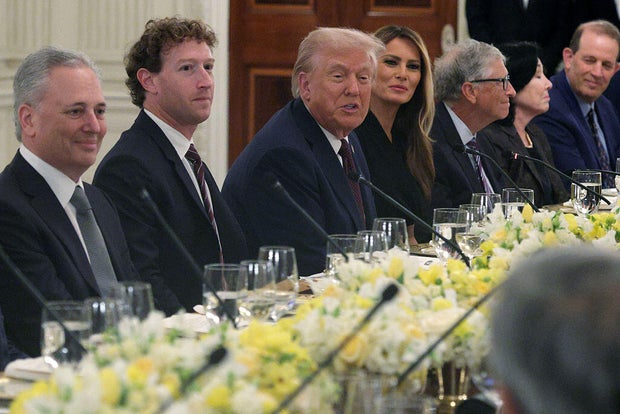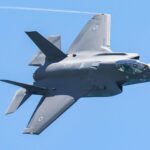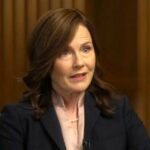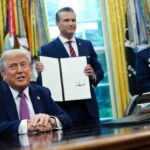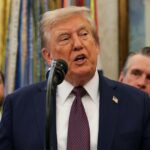In a recent high-profile event in Washington, President Donald Trump held an exclusive dinner at the White House, hosting a cadre of prominent figures from the tech industry alongside other esteemed business and political leaders. The gathering, which took place on a Thursday evening aimed to convene some of the brightest minds in the technology sector, although Tesla CEO Elon Musk was notably absent from the proceedings despite having been invited.
The guest list for this event read like a who’s who of the tech world, featuring more than a dozen prominent figures including Meta founder Mark Zuckerberg, Apple CEO Tim Cook, Microsoft founder Bill Gates, OpenAI founder Sam Altman, Google CEO Sundar Pichai, and Microsoft CEO Satya Nadella. The assembly of such high-profile individuals underscored the evening’s significance and the importance of tech industry relationships in Trump’s administration.
During the dinner, President Trump was positioned next to Mark Zuckerberg, with Bill Gates seated adjacent to First Lady Melania Trump. The setting provided an intimate environment for discussions on various topics relevant to the tech community and beyond. President Trump took the opportunity to express his admiration for the collective intellect and entrepreneurial spirit of his guests, acknowledging their profound impact on contemporary business practices and technological innovation. “This is definitely a high-IQ group, and I’m very proud of them,” Trump remarked, highlighting the esteemed nature of his audience.
The evening also served as a platform for dialogue on cutting-edge advancements and tech-related policy initiatives. Beyond the meal and mingling, several tech executives, including Zuckerberg, Nadella, and Pichai, were invited to share remarks, which allowed for a broader discussion on technology’s role in shaping the future.
Among the key speeches, Bill Gates elaborated on public health initiatives, a focal point of his philanthropic work. His comments came just hours after Robert F. Kennedy Jr., a noted vaccine skeptic and the current Secretary of Health and Human Services, faced pointed questions in a Senate hearing about his stance on vaccines. Gates praised the administration’s efforts through Operation Warp Speed in accelerating COVID-19 vaccine development and distribution but also highlighted ongoing challenges in combating other diseases, such as HIV and sickle cell anemia.
Despite the general optimism of the evening, the absence of Elon Musk loomed large. Musk, recognized globally as one of the richest individuals, noted on social media platform X that although he was invited, he could not attend but would send a representative in his stead. This announcement followed Musk’s previously publicized disagreements with President Trump, which culminated in his departure from the administration’s circle and subsequent critiques of its policies and leadership.
Musk’s political divergences included severe criticism of the administration’s spending habits and its handling of sensitive governmental information, known colloquially as the “Epstein files.” These disagreements had culminated earlier in the year with Musk’s declaration of his intent to create a new political party, the “America Party,” although this venture had yet to materialize fully at the time of the dinner.
Despite their strained relations, President Trump expressed a belief earlier in the week during an interview that Musk would realign with the Republican Party, suggesting that Musk’s options were limited given his ideological and practical disagreements with the more liberal political factions. Trump’s reflections on Musk were a mixture of praise and critique, acknowledging Musk’s brilliance while also pointing out areas where he believed the tech mogul could improve.
Beyond the immediate discussions and interactions during the dinner, the event emphasized ongoing relationships and collaborations. President Trump had previously welcomed tech leaders at various White House events, which often included discussions on significant commitments to U.S. investments and innovations. For instance, Tim Cook announced a sizable $100 billion commitment from Apple to U.S. manufacturing at a previous event, highlighting the administration’s encouragement of domestic production and investment by large tech companies.
The administration had also taken notable steps in directly engaging with tech firms, such as acquiring a 10% stake in Intel following discussions at the White House—a move that had sparked debate among conservatives and economists regarding its implications for government involvement in private enterprise.
In conclusion, the dinner hosted by President Trump at the White House was not merely a ceremonial gathering but a testament to the complex and evolving relationships between the U.S. government and the technology sector. It showcased ongoing dialogues about innovation, public health, economic policy, and international competitiveness. Moreover, it highlighted the personal dynamics and potential tensions that underline political and business interactions at the highest levels. The blend of praise, policy discussion, and personal anecdotes from the dinner painted a vivid picture of the current administration’s ties with the leaders who are shaping the future of technology and business.

